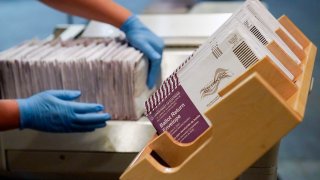
The same day former Mayor Marty Walsh submitted his resignation letter to the Boston city clerk, he also sent a letter to the City Council asking them to move the upcoming preliminary municipal election a week earlier.
The March 22 letter pointed to a potential expansion of vote by mail that would include upcoming fall elections as a reason to move the preliminary election in the city from Sept. 21 to Sept. 14.
WATCH ANYTIME FOR FREE
>Stream NBC10 Boston news for free, 24/7, wherever you are. |
Voting by mail provisions were extended through June 30, under a law Gov. Charlie Baker signed in mid-March, and bills have been filed in the Legislature this session to make the practice permanent.
"The preliminary municipal election occurs on the sixth Tuesday preceding the general election," Walsh wrote in his letter. "This year, however, due to a potential expansion of vote by mail to include the fall elections, the timeframe for certifying election results and the department's requirement to hold a ballot position drawing, the original date would create a challenge for the printing and distribution of vote by mail ballots."
Get updates on what's happening in Boston to your inbox. Sign up for our >News Headlines newsletter.
Boston's city charter allows local officials to set the date of a preliminary election, leaving the decision making process at the city level and not requiring the proposal to go to the State House in the form of a home rule petition. Boston City Council Committee on Government Operations, led by Councilor Lydia Edwards, plans to hold a hearing on the issue Tuesday at 11 a.m.
A spokesperson for Edwards told the News Service she supports the recommendation.
Boston Commissioner of Elections Eneida Tavares said the proposal will provide election officials additional time between the September preliminary and November general elections to print and distribute ballots "in anticipation of a potential expansion of mail-in voting."
Local
In-depth news coverage of the Greater Boston Area.
"Regardless of passage, however, Boston will administer the fall elections in a way that ensures equitable access to the ballot box for all registered voters in the City while also ensuring that both elections are properly managed and conducted in accordance with city, state, and federal laws," Tavares said in a statement to the News Service.
The law extending voting by mail options through June 30 came as a response to the hundreds of cities and towns with spring municipal elections on the calendar. That law allows for early in-person voting, mail-in voting, and flexibility in scheduling municipal town elections.
For Boston, however, those provisions would expire --- pending any legislative action -- well before the city's preliminary and general elections that happen later in the year. And the state's capital is not the only city or town holding a municipal election later this year. A spattering of mayoral departures has left city's like Lawrence, Newburyport, and Holyoke with competitive fall elections.
Debra O'Malley, a spokesperson for Secretary of State William Galvin, said her office agrees that having more time between the preliminary and general elections is a good idea considering the amount of time it takes to send out, receive, and process mailed-in ballots.
Sen. Barry Finegold filed legislation (S 468) in February on behalf of Galvin that would make voting by mail a permanent option in Massachusetts.
The bill proposes expanding in-person early voting, implementing same-day registration, and allowing eligible voters to update their voting information at the polls on Election Day prior to casting their ballot.
"We expect and hope that something will be in place well before these preliminaries so people can apply for their ballots and start receiving them," O'Malley said.
Five of the six major candidates for Boston mayor and five at-large Boston City Council candidates also wrote a letter to Galvin, Finegold and House Election Laws Committee Chairman Dan Ryan, of Boston, on Tuesday asking the secretary or the Legislature to take action to reduce the number of signatures required to qualify for municipal ballots this year in light of the ongoing pandemic.
Mayoral candidates in Boston must collect 3,000 signatures and council candidates are required to gather 1,500 signatures from registered voters. The Supreme Judicial Court last spring got involved and cut by the half the required number of signatures candidates needed to collect during the 2020 cycle, and allowed for some use of electronic signatures.
"The ongoing COVID-19 pandemic renders in-person signature collection dangerous to public health," the Boston candidates wrote.



